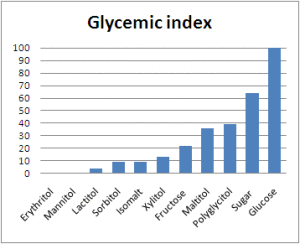Contrary to what the column title may suggest, a sugar alcohol is neither a sugar nor an alcoholic beverage. They are white, water-soluble solids that can occur naturally or be produced industrially from sugars. They are used widely in the food industry as thickeners and sweeteners. In commercial foodstuffs, sugar alcohols are commonly used in place of table sugar (sucrose), often in combination with high-intensity artificial sweeteners to counter the low sweetness. Common sugar alcohols include glycerol, erythritol, threitol, arabitol, xylitol, ribitol, mannitol, sorbitol, galactitol, fucitol, iditol, insitiol, volemitol, isomalt, malitol, lactitol and maltotetraitol. Xylitol is perhaps the most popular sugar alcohol due to its similarity to sucrose in visual appearance and sweetness.
Sugar alcohols do affect blood sugar levels, though less than sucrose. (See the chart.) This is because they are incompletely absorbed into the bloodstream. This is what makes them popular sweeteners among diabetics and people following low carbohydrate diets. However, this limited absorption trait can also be the cause of bloating and diarrhea. One exception is erythritol because it is absorbed in the small intestine.
There is a wide range of individual tolerance for sugar alcohols. Some individuals can consume several servings with no unwanted side effects. For others, a single serving can send them running to the bathroom.
Know that for some people, the taste of anything sweet will derail their ability to adhere to Fat-Burning Machine principles because they end up craving more sweets after consuming anything sweet tasting. The best way to know is to keep your food journal notes in good order.
The current research isn’t suggesting that these compounds are linked to cancer or diabetes.
Any potentially negative effects seem to be individual and subjective, so you can decide for yourself if consuming these products fit into your diet or not.
That written, if you’re doing fine without sweeteners (non-caloric, hypo-caloric, artificial, natural, whatever), there is no reason to go looking for an excuse to introduce sugar substitutes.
Chart from the International Starch Institute

